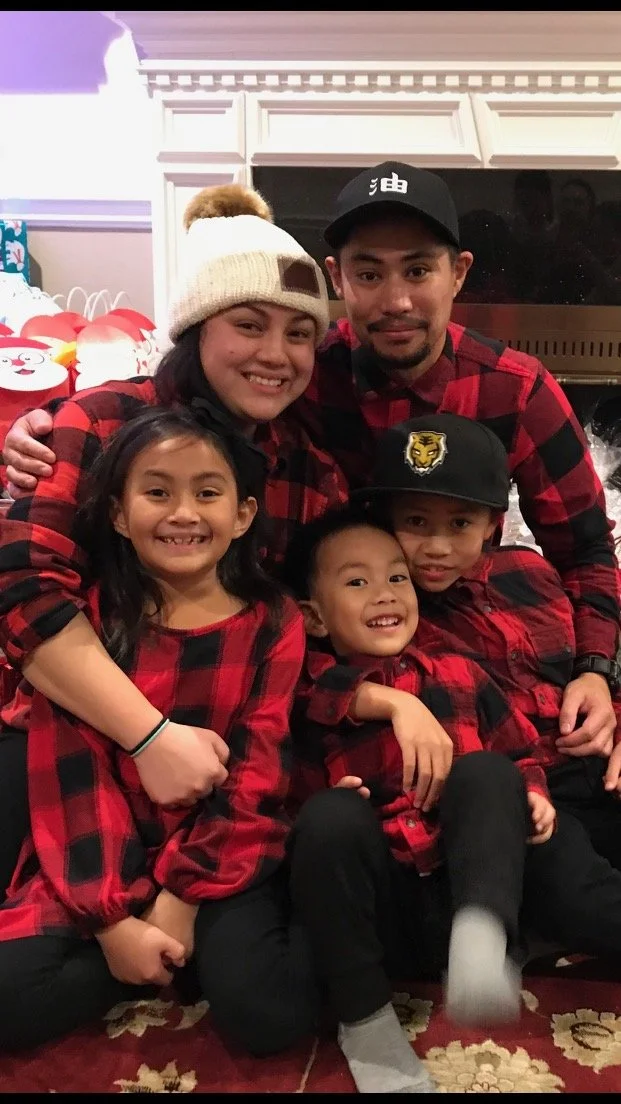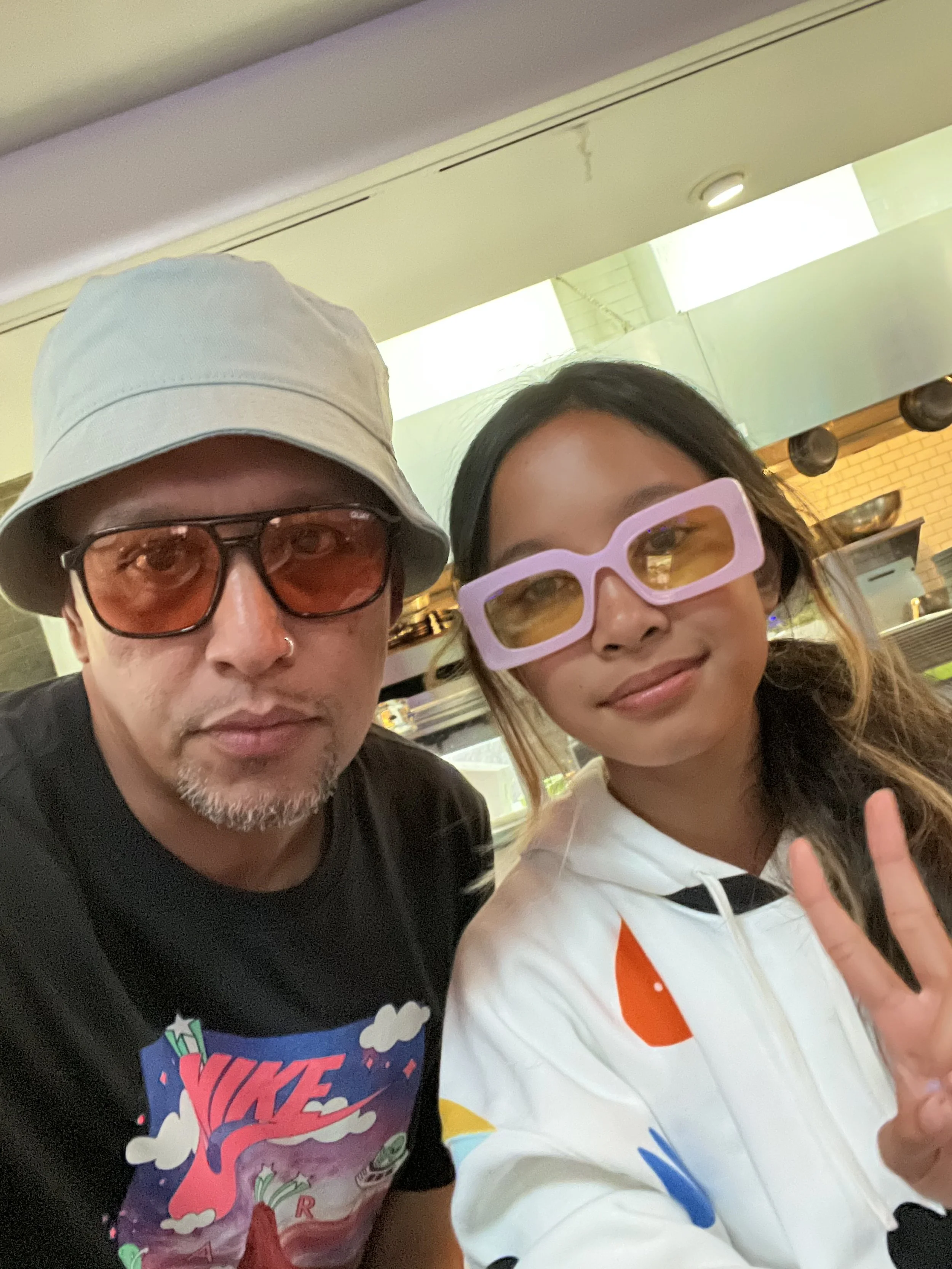Celebrating Filipino Fathers: 4 Filipino Dads Tell Us How They *Really Feel*
Celebrating Filipino Fathers: 4 Filipino Dads Tell Us How They *Really Feel*
Written by Sheena Minoc
Therapin*y Team
4 Filipino dads to tell us how they *really feel* about fatherhood. Fair warning, some of their responses might make you wonder who is cutting onions up in here 🥲
There are two Filipino dad stereotypes — 1) the stoic head of the house, and 2) the rowdy jokester. Neither one of those stereotypes include lots of feelings sharing and sometimes we forget that our dads are multidimensional people.
I asked Tony DelaRosa (Author of Teaching the Invisible Race and Racial Equity Strategist), Francis Ang (Chef & Owner of Restaurant Abaca), Fran Boogie (Dot Connector / Culture Champ), and Ryan Caylao (Co-founder of Kapwa Baking Co.) to share their experiences as Filipino fathers.
What are your favorite things about being a father?
Ryan caylao w/ wife faye & their children jedi, 10, Cammy, 8, jax, 4
Ryan —
“There’s so many great things about being a father. I love that I have an excuse to be silly. I love having the opportunity to teach the lessons I learned. I love those random moments where your kids will say or do something and unintentionally brighten your mood. I love watching them grow. I love their laughs. But the best thing about being a dad is the feeling of giving and receiving love, unconditionally. That feeling you get when they fall asleep on your chest, or when you embrace after an argument, it’s like time stopped for second — THAT’s my favorite thing about being a father.”
Tony —
“I love instilling the power of reading with him. My wife and I read to Sebastian around 2-3x everyday. I nerd out at watching him choose books over anything else, especially when the books happen to be artistic and anti-racist in nature. I was never that child growing up.”
Francis —
“Being able to make Dominique laugh, being able to hang out and spend time with my family.”
What are the most challenging things about being a father?
Tony —
“I think combating toxic masculinity and helping him embrace a more gender fluid identity is really difficult. As both a racial equity strategist and father, I've come to realize how much binary thinking both drives and is driven by capitalism, patriarchy, and white dominance. Such a vicious cycle. Those oppressive forces are the wells we drink, and seeking and building anew IS the change for my son.”
Francis —
“Knowing whether I’m doing, saying and teaching the right things for my child.”
Fran Boogie —
“Watching your child grow up faster than you expected. Having to compete for attention- me vs. her iPhone and Tik Tok, LOL.”
What do you do to cope with the stress of fatherhood while juggling other commitments?
Fran Boogie —
“Always keep in mind that your child comes first. We all have to sacrifice and do what’s best. Life is not easy. Talk through your feelings and emotions with people that are important to you. It’s not easy being a father, especially with the type of work that I do. Whatever you do, don’t keep things bottled in.”
Tony —
“I do a few things that help me cope with stress as a father: 1) workout 3x a week, 2) on days when I don't work out I read poetry and listen to artist / curators talk about their craft, and 3) I have strong open communication with my wife.”
Ryan —
“Lots of alcohol… Lol, jk. I need to find alone time. Sometimes all it takes is locking myself in my room or being up after the wife and kids are asleep and watch a show, reading a book, or play video games in peace. When things get tough, I tend to spiral down and need more distance than another room in the house. I’ll ask my wife to take the kids somewhere or go out by myself and self assess then reflect on what I’m stressed about and what to do about it. A change in environment & a change in perspective.”
Fran Boogie & Simone garcia, 10
Do you think therapy is helpful for dads?
Tony —
“I do, especially for dads of color. First, I assert that most dads of color do not seek out therapy as much as we could and/or should. I assert this because I for one know that therapy can be liberating, because I've seen family and friends who have attested to it (100% of them are women), yet the last therapy session I engaged in was in 2019 with a Babaylan while I was doing a fellowship in the Philippines.
I think because the idea of 'therapy' falls under a feminist labor market or generally under feminist ideology, dads may not automatically think it's for them. But that's how toxic masculinity operates, it makes gates to liberation unattractive and inaccessible. I think therapy can help us unpack toxic masculinity as it shows up and create ways to combat it in order to embrace a more tender, fluid, and nurturing side we all have in our bodies.”
Fran Boogie —
“Very much so. Therapy isn’t and shouldn’t be limited. At the end of the day, we all have things these we need to talk about.”
Ryan —
“Every person has baggage to unpack. We all deal with something; trauma from past experiences, issues caused by how we were raised, or cultural beliefs and expectations from all the “groups” we’re in. The expectations of being a man, a father, a husband, Filipino, and all the other “groups” we’re apart of, give us an image of who we believe we “should” be. I think being a parent especially, we strive to meet this, sometimes impossible, image for our children. Therapy gives us a way to sift through all that mess, then understand and grow from it.”
Is there anything you learned from your father, mother, or guardian that has shaped the way you raise your kid(s)?
Francis —
“Growing up, I remember spending time with my family traveling during the summers. We constantly eat at restaurants or cook at home on the weekends. I was constantly tasting and experiencing new things. It’s definitely shaped me with whom I am today being a chef. I want Dominique to have the same experience.”
Ryan —
“My parents divorced when I was 10 and I went to court to try and live with my dad, but was forced to live with my aunt (Tita Pepper) who became my legal guardian through that trial. The following years, I jumped around, living with my mom & different aunts (Pepper & Elsa), uncles (David & Jun). With my own mom & dad I learned problems with our Filipino-American culture that I don’t want to pass on; like being silent with our true thoughts and feelings. Tita Elsa & Tito Jun taught me how to show love to my children and properly shelter them from adult issues. Tito David helped push me out of a dark place, which taught me that sometimes, I need to be “the bad guy” to nudge my kids into growth. (They’ll understand later, lol) But the most important lesson was from my Tita Pepper - she taught me how to be present in people’s lives & the impact that being there for someone can make.”
Fran Boogie —
“Yes! Growing up in a Filipino household where both parents worked long nights and days to keep a roof over our heads, food on the table and clothes on our back but didn’t know how to express their feelings or show love other than through material things. I’m correcting that lack of emotion and compassion by telling my daughter that I love her, every single day - 20 times over.”
Tony —
“Since my father didn't have a father growing up, he promised us that he would be an incredible dad, which he has been. Being able to spell love through time and action has been something I've learned from him.”
Is there any advice you would give other Filipino fathers?
Tony —
“Dear Filipino Fathers, first I want to say mahal kita. Second, I want to encourage you to seek out where binary shows up in your life, and how that manifests in how you show up as a father. Question yourself: is your masculinity tender or toxic? One way you can see this manifest is through how you keep your little ones accountable. Do you use authoritative power and force when your little one doesn't follow your directions, or do you lean into curiosity, consent, and compassion?”
Francis —
“We were taught to work hard - work multiple jobs even. It often leaves us with no time to spend with our families. That was the case for me. I didn’t get much time with my father growing up. I wish I did. That’s why I pay attention to Dominique and really spent some quality time with him when I can.
Advice? Work life balance is important.”
Ryan —
“Be present & love loudly.”
Fran Boogie —
“Break the generational trauma. My father didn’t show me much emotion growing up. I couldn’t even tell you the last time he told me he loved me. But when I got in trouble, which was often, he made sure I know I fucked up LOL. Don’t be that dad - be the dad who is overly annoying, texting and telling your kid how much you love them. I am annoying dad.”
Tony Delarosa & Sebastian Rizal Delarosa, 1
Happy Father’s Day to all the Filipino fathers, father figures, and guardians out in the world putting in the daily work. Being a dad is tough, but you have our love, appreciation and support. If you need a therapist, health & wellness practitioner or ancestral healer, please visit our directory of practitioners who are experienced in the issues we face as Filipino/a/x people. There’s nothing we can’t tackle as a community.





